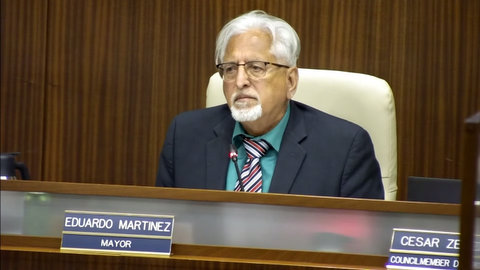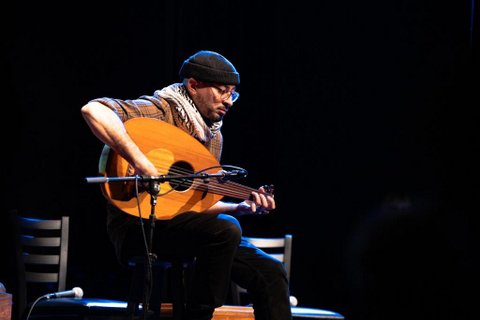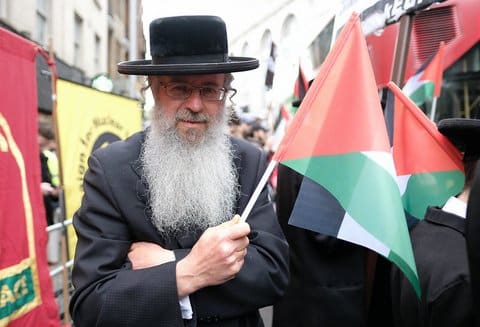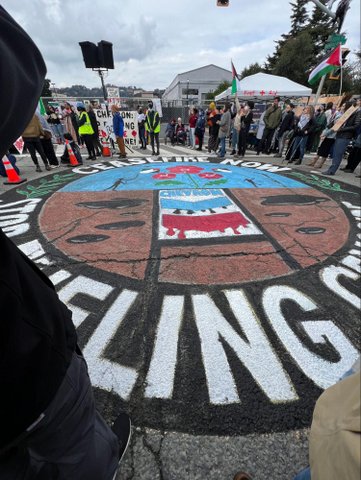
01 May Richmond to Divest From Israel-Linked Companies

“So many young people have put their lives, their bodies, livelihoods on the line to voice their resistance to what’s happening,” said Richmond Mayor Eduardo Martinez, referring to the Israel-Hamas war. (Screenshot captured by Samantha Kennedy / The CC Pulse)
By Samantha Kennedy
The Richmond City Council voted at a special meeting Tuesday to restrict city investments from 10 companies that have links to what it officially referred to as Israel’s ongoing “relentless assaults” that have killed over 30,000 Palestinians in Gaza.
The divestment comes during the monthslong push by U.S. activists and supporters of those in Gaza who ask their government not to be complicit in Israel’s treatment of Palestinians.
Richmond has been among the first in the country to answer these calls — being the first U.S. city to call for a ceasefire weeks after Oct. 7 and now the second Bay Area city to divest from Israel-linked companies.
@ccpulseIn a special City Council session Tuesday, the Richmond City Council approved a resolution instructing city staff to revise the city’s investment policy. The updated policy will prohibit investing city funds in industries associated with violence, warfare, oppression and apartheid.
On the list of restricted companies are Airbnb, Caterpillar, Cisco, Dell, First Solar, Intel, International Business Machines Corporation, or IBM, Microsoft, Motorola and Wix.com. Certain products and technology produced by these companies “enable Israel’s attacks on Gaza,” which allows them and investors to profit from attacks on Palestinians’ rights and lives, according to the staff report.
>>>Read: Protestors Accuse Chevron of Environmental Racism in Palestine and Richmond
“We all have a conscience. For some of us, that conscience is activated right away,” Mayor Eduardo Martinez said. “ For the rest of us, it takes time to catch up.”
The vote to divest, which passed nearly unanimously with council member Cesar Zepeda abstaining, was a way the city could “act on (its) conscience” during the Israel-Hamas war, according to Martinez. He says other actions, specifically those by young people, inspired the divestment.
“So many young people have put their lives, their bodies, livelihoods on the line to voice their resistance to what’s happening,” he said. Martinez referred to the self-immolations of Aaron Bushnell and an unidentified woman outside Atlanta’s Israel consulate, who did so in protest of Israel’s war in Gaza.
>>>Read: Youth Lead Pro-Palestine Vigil at Unity Park
Most of the council previously called Israel’s actions ethnic cleansing and genocide in its ceasefire resolution, echoing activists’ pleas that have recently turned into protest camps on college campuses across the country. Those camps have popped up nearby — at Stanford University, San Francisco State University, the University of San Francisco and UC Berkeley — to ask each institution to divest from Israel-linked companies.
In January, Hayward became the first Bay Area city to divest from Israel-linked companies that profit from Israel’s attacks in Gaza. Hayward also included Intel and Caterpillar as part of its divestment list.
Like Hayward’s divestment, Richmond’s was controversial. Much of the public spoke in support of the divestment, with one speaker going so far as to call Richmond the “moral compass of the Bay Area.” But some criticized the council for holding the meeting, which also included a proclamation recognizing Jewish American Heritage Month, on the last day of Passover, a Jewish holiday in which some don’t participate in several activities on the first and last two days.
“The chutzpah of this council, the nerve of this council to do this on the last night of Passover is reprehensible,” said Jonathan Mintzer, the director of external relations at the Jewish Community Relations Council.
>>>Read: City Council Resolution Alienates Jewish Richmonders
But Dov Baum, a Jewish Israeli and director of the American Friends Service Committee’s corporate accountability and research, said that was no excuse. She said much of the information provided in staff’s presentation on corporations was based on research done by her group and supported the divestment.
Funding Israel’s apartheid and fueling its impunity is “not helping Israel. It’s not helping the people of Israel. It’s not helping Jews; it’s killing us,” Baum said. “It’s taking away our future.”
Voting Reforms to Be on Richmond Ballot
Richmond voters will have another measure on their ballots this November after the Richmond City Council voted to allow residents to consider Instant Runoff Voting, also known as ranked-choice voting, for council elections.
The measure will be one of two that looks to reform the current voting system Richmond uses for elections in hopes of better representing residents. The other is the Richmond Election Reform Act.
A ranked-choice voting system, should it pass, would allow a voter to rank candidates running for council or mayor based on who they prefer for the position. For Richmond elections, which use Dominion Voting Systems through the county, that would only allow up to 10 candidates to be ranked for each seat because of system constraints.
Current Richmond elections are decided like most other California cities — through a plurality vote. This means that a candidate can win without receiving a majority of votes. In this system, a voter picks one candidate for each seat.
In Richmond’s last election for council members and the mayor, for example, council member Doria Robinson and Mayor Eduardo Martinez did not receive a majority of votes in their respective races. Votes to Robinson’s two opponents totaled 60% of votes and Martinez’s three opponents also received 60% between them.
Ranked-choice voting would mean that a candidate elected to office would always receive a majority of votes. If no candidate receives a majority of first-choice votes, then whichever candidate received the fewest votes is no longer considered. Those who voted for that candidate as their first choice have their second-choice vote count toward another candidate to see if a majority can be reached. The process lasts until a majority is reached.
Proponents say ranked-choice voting encourages civil discourse and diversity among candidates.
Jim Lindsay, co-founder of California Ranked Choice Voting, said his town of Albany’s use of ranked-choice voting led to an Asian council member being elected and attracted more Asian and young voters because of the diversity of candidates.
Ranked-choice voting has also been used in Berkeley, Oakland and San Francisco.
Proclamation Recognizes Cinco de Mayo
The Richmond City Council passed a proclamation recognizing Cinco de Mayo festivities in the city this year.
The holiday is “much more than just a historical date,” according to the accompanying agenda report, and is a celebration, “fostering community spirit and pride.”
Cinco de Mayo celebrates Mexico’s defeat of French forces in 1862. Richmond’s Cinco de Mayo parade will take place May 4 from 10 a.m. to 12:30 p.m.
A festival that will “showcase the richness of Mexican culture” will take place on May 5 from 10 a.m. to 5 p.m.






No Comments